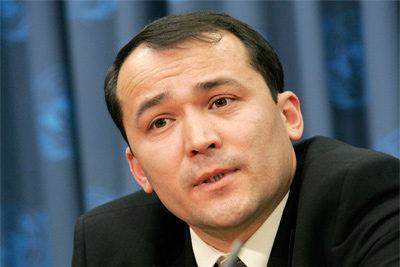
Uzbekistan plots steady, neutral course, diplomat says at UVU
Murak Askarov, Uzbekistan’s ambassador to the United Nations, addressed UVU’s international relations students. He said that rather than be a pawn of world powers including Russia, China, and the United States, the former Soviet republic proudly maintains its independence.
"Uzbekistan is consistent in preserving its independence. We want to be a friend to everyone. But not at the expense of our independence," he said. "All the problems and misinterpretations of our policy come from other countries when we say no to efforts to intervene in our domestic affairs."
With a geographic size and population (28.5 million) on par with the state of California, the Republic of Uzbekistan is a popular tourist destination for its ancient cities of Khiva, Bukhara and Samarkand, he said. A regional transportation and communications hub, the country has recently fulfilled goals of becoming self-sufficient in terms of domestic energy and food production.
Askarov said Uzbekistan is the world’s No. 7 exporter of uranium, among the top 10 nations in gold exportation, and is among the top 20 countries in oil reserves.
"Today we produce three times as much oil as we did in 1991," he said.
It also annually exports 31 billion cubic meters of natural gas, an amount that could sustain all the natural gas needs of a nation like Germany that has the world’s No. 3 economy, he said. Uzbekistan is also the No. 1 exporter of fruit and vegetables (six to seven million tons) among former Soviet countries.
The economic stability achieved by its vast natural resources and know-how has helped Uzbekistan weather the current global financial crisis, Askarov said. His country’s gross national debt is 4 percent. America has gotten away from proven models of financial stability and security such as having a domestic manufacturing industry while running up a ballooning national debt, he said.
Since the mid-90s, Uzbekistan’s stability stems from its adoption of two key priorities -- it followed the Southeast Asian policy in developing and encouraging an import substitution program while promoting its own global exports.
"We’re not in a big recession," Askarov said.
In regards to the war on terror and its neighbor, Afghanistan, he said that eight years before the 2001 terrorist attacks on America, Uzbekistan’s president addressed the U.N. and warned America "to be careful about things in Afghanistan," Askarov said.
Since then, Uzbekistan has attempted to act as a peace broker with the US, Afghanistan and other regional neighbors, including Russia, to stop the violence and export of illegal narcotics coming out of Afghanistan. Its efforts included an address on 31 March at a conference in the Netherlands that keyed on the cooperation of Afghanistan’s neighbors.
During a question-and-answer session afterward, Rusty Butler, UVU’s associate vice president of international affairs, asked what happened to the coalition military airbase the US and its allies operated out of Uzbekistan early on in the wars in Afghanistan and Iraq.
Askarov said that Uzbekistan’s government decided that that type of cooperation was problematic and "unnecessary for our American friend." But just days ago, the two nations’ governments inked a new agreement that facilitates the transportation of non-military cargo to Afghanistan through his country, he said.